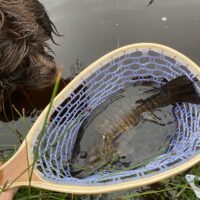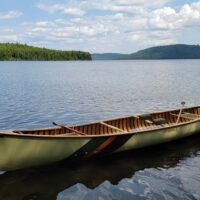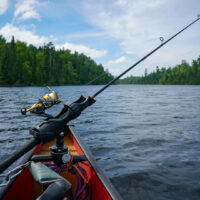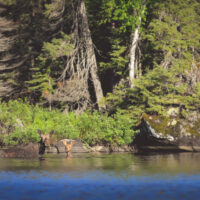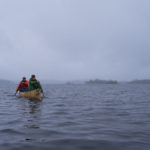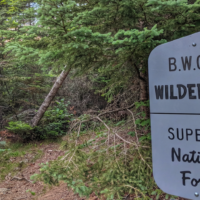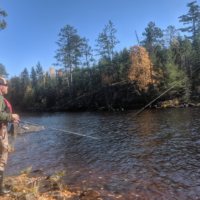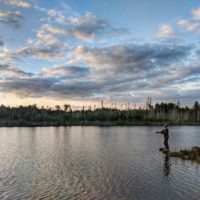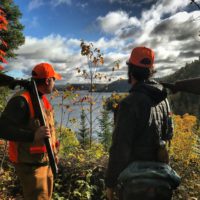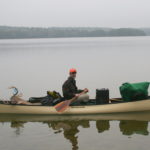What Exactly Is USDA’s Stance on the Boundary Waters?
September 24, 2019 6:18 pmOnce determined to proceed with a thorough environmental review of an unpopular proposed mine, the agency now only seems willing to pass the buck to the state
by Spencer Shaver and Whit Fosburgh
It is a truism that politicians try to have it both ways, telling constituents and donors just what they want to hear while their actions tell a different story. We are seeing this play out in Minnesota, where Sportsmen for the Boundary Waters have been fighting to protect the Boundary Waters Canoe Area Wilderness from a proposed copper-nickel mine.
In this case, the U.S. Department of Agriculture has made and broken commitments concerning an important environmental review of the proposed mine, which has limited the use of science, the public’s input, and the ability of federal land management agencies to affect the outcome of the project.

Photo courtesy of Sportsmen for the Boundary Waters.
In 2017, Secretary Perdue committed to a two-year environmental review of copper nickel mining upstream of the Boundary Waters during his congressional testimony, saying, “We are determined to proceed in that effort and let it run its course. No decision will be made prior to the conclusion of that [review].” But 20 months into the 24-month study, Secretary Perdue canceled the study, calling it “a roadblock to mining exploration.” The BLM and USDA then renewed the contested leases in 2019, which cleared the way for mining company Twin Metals to submit a formal mine plan of operation to state and federal officials.
In a long back and forth with the USDA and U.S. Forest Service, Sportsmen for the Boundary Waters and other conservation groups requested in May 2019 that the study be completed prior to the renewal of any mineral leases in the Boundary Waters watershed. That request was ignored. Now, it seems that Perdue is suggesting that it is up to Minnesota Governor Tim Walz to stop the mine from being built and that he could do so without an environmental study.
This is not the case: The Forest Service is required to lead on all environmental reviews and NEPA analyses of projects on federal land, in this case, the Superior National Forest. The former chief of the Forest Service understood this well when he withheld consent for the renewal of these leases in 2016. Secretary Perdue seems to understand the risk the project poses to the Boundary Waters, and he originally expressed real concern for making sure no harm came to the habitat.

Photo courtesy of Sportsmen for the Boundary Waters.
Sportsmen and women want more from federal decision-makers than acts of good faith toward conservation goals. Instead, we’re seeing a disturbing trend of leaving the states with total responsibility for any real decisions concerning environmental review, permitting, and the protection of important fish and wildlife resources.
Twin Metals is due to submit a mine plan of operation in the coming months without public input or the level of study that would have been conducted in the canceled mineral withdrawal study. Their proposed project on the South Kawishiwi River has the potential to pollute the Boundary Waters, Voyageur’s National Park, and Canada’s Quetico Provincial Park. The remote nature of these public lands and waters makes remediation or cleanup of any pollution essentially impossible.
And the fundamental question the canceled study was meant to answer has never been answered: Is this the right place for a copper mine?

Photo courtesy of Sportsmen for the Boundary Waters.
Secretary Perdue followed up his statements in Minnesota with an op-ed in a local paper, writing, “I’m confident any plan approved to move forward would preserve the high-quality fishing, wildlife viewing, recreational opportunities and wilderness character that Minnesotans and visitors from around the world enjoy in the Boundary Waters.” Hunters, anglers, and paddlers who use the Boundary Waters do not share Secretary Perdue’s confidence.
More than 180,000 people weighed in during the Forest Service’s environmental review—the one that was halted before it could be finished—and thousands of Minnesotans turned out to public listening sessions across the state. The USDA could restore the public’s confidence by committing to completing the canceled study and halting all mining approvals, including any federal permitting related to a mine plan of operation, until the study is released publicly.
Not all development makes sense, especially where fish and wildlife actually provide greater value to citizens who love to hunt and fish, but also to our economy. This was the exact reason that President Theodore Roosevelt initially set aside the Superior National Forest in 1909 as a place to be protected for future generations. The Boundary Waters and Superior National Forest contain 20 percent of the fresh water in the entire 191-million-acre National Forest System and a quarter of the freshwater streams in the agency’s entire Eastern Region.
To uphold Theodore Roosevelt’s conservation legacy, we must urge our elected officials to defend our public land and water, or future generations will pay the price for our inaction.
Whit Fosburgh is the president and CEO of the Theodore Roosevelt Conservation Partnership, a national nonprofit working to guarantee all Americans quality places to hunt and fish.
Spencer Shaver is the conservation director for Sportsmen for the Boundary Waters, which works to protect the integrity of the Boundary Waters Canoe Area Wilderness and its watersheds for huntable and fishable populations of fish and wildlife, now and forever through advocacy and education. You can take action to protect the Boundary Waters by contacting your elected officials here.
This story also ran on the Theodore Roosevelt Conservation Partnership website
Categorised in: Blog, Fishing, Hunting, News, Partnerships









